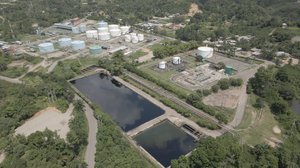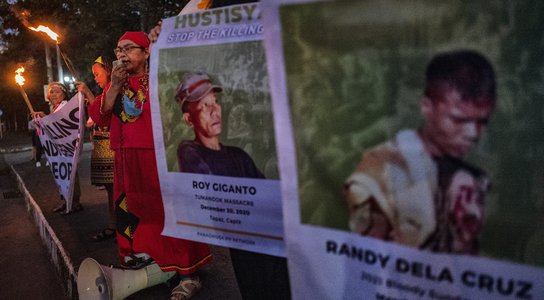Over the last ten years, 322 people have been killed in Colombia for their work to defend their land and environment. Behind this figure are individuals whose lives have been brutally cut short, leaving behind families and communities. Their work is essential for us all and for the future of our planet. Yet, it is costing them their lives.

Aerial shot of a water plant in Barrancabermeja, Colombia. The Magdalena Medio communities are struggling due to the presence of many extractive business -including logging and mining- affecting local fishing and small-scale agriculture. Negrita Films / Global Witness
As we lay out in our latest report, A Decade of Defiance, the killings are just the tip of the iceberg. Land and environmental defenders also face countless non-lethal attacks such as threats, harassment, surveillance and criminalisation. When a defender raises their voice against a mining company that operates without consulting local communities, when they denounce the water pollution from an oil company, or when they oppose the forceful displacement of a community, they pay a price for it.
Colombia and other countries in Latin America are some of the world’s deadliest countries for environmental defenders, yet the region is also highly vulnerable and exposed to irreversible impacts of climate change.
Our report documents the appalling reality in Colombia and calls for urgent action. This includes ratification by the Colombian Government of the Escazú Agreement, the first regional environmental and human rights treaty in Latin America and the Caribbean, and the first legally binding instrument in the world to include provisions on environmental defenders.
Most significantly, the Agreement requires governments to prevent and investigate attacks against environmental defenders. The Agreement also addresses crucial issues such as access to information, public participation, access to justice and guaranteeing a safe environment for defenders.
Colombia signed the Agreement in December 2019. However, almost three years later, its ratification is still pending. This is a necessary step for the Agreement to enter into force and, in turn, for the Colombian government to demonstrate its true commitment to increase protections for defenders.
Colombia has consistently recorded some of the highest numbers of killings of land and environmental defenders over the last decade. Yet, there are reasons for optimism. Firstly, the programme presented by Gustavo Petro’s new government includes specific language about defenders and the actions required to address the enormous challenges they face. This marks an urgent shift away from a past in which violence against defenders was ignored and dismissed by the authorities, which refused to take any action or responsibility.
Another reason for optimism is the resilience local organisations have shown for years, fiercely and systematically documenting the situation of land and environmental defenders and advocating for urgent action by the state. Civil society organisations, indigenous peoples, and other actors with valuable experience have passionately – and strategically – shaped many of the reforms needed in Colombia.
One example is that of Somos Defensores, a Colombian civil society organisation that has, for almost two decades, worked to secure effective protection for human rights defenders, holding state institutions accountable, sharing knowledge with partner organisations and increasing public awareness.
Somos Defensores and other civil society organisations in Colombia have recently presented an Emergency Plan to protect social leaders, human rights defenders, and signatories of the Peace Agreement. The Plan includes suggested actions for the first 100 days of government including measures to guarantee the effective participation of environmental defenders.Colombia is at a crossroads: it can either keep perpetuating the practices and policies that have already cost the lives of too many defenders, or it can lay the foundations toward peace and sustainable development, ensuring that nobody is left behind. The clock has been ticking for too long, and it is time for defenders to be front and centre. There can be no more deaths for defending life and our planet.


